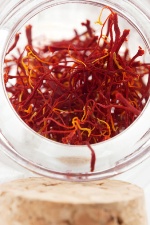 Though long prized by chefs because of its delicate flavor, saffron has only recently found widespread recognition as an alternative medicine.
Though long prized by chefs because of its delicate flavor, saffron has only recently found widespread recognition as an alternative medicine.
This Mediterranean herb is, however, gaining popularity as one of the best natural remedies for depression. Though clinical evidence is still preliminary, it suggests that saffron, found in many kitchens, could have benefits that have been overlooked for a very long time.
Saffron is derived from the dried top of the Crocus sativa flower. It takes a monumental 75,000 flowers to produce just one pound of saffron spice. While it’s been used in cooking for ages, it also has ancient roots for medicine—specifically:
- Improving digestion
- Relieving coughs
- Relaxing muscle spasms
- Calming anxiety, and improving mood.
The most compelling evidence for the use of saffron is in the treatment of depression. There have been at least five small studies that were of good quality that administered about 30 milligrams of saffron per day to test subjects. They arrived at the same result: the herb is more effective than a placebo, and as effective as prescription antidepressants. Unfortunately, all of the clinical studies were small, and were performed by the same set of researchers in Iran.
Still, it’s not a long shot that saffron will work for treating depression. Look for supplements in the 30-mg dose range, and make sure they are alcohol-based extracts, because alcohol helps with absorption.
Also, it appears to be safe, as no serious adverse effects have been spotted in studies, even using doses as high as 200 mg per day. Because it poses no identifiable dangers, saffron can be taken even by young children, and pregnant or nursing women, but people with liver or kidney disease should avoid taking the supplement.
Sources for Today’s Articles:
This Herb May Help Treat Depression
Moshiri, E., et al., “Crocus sativus L. (petal) in the treatment of mild-to-moderate depression: A double-blind, randomized and placebo-controlled trial,” Phytomedicine September 14, 2006.
